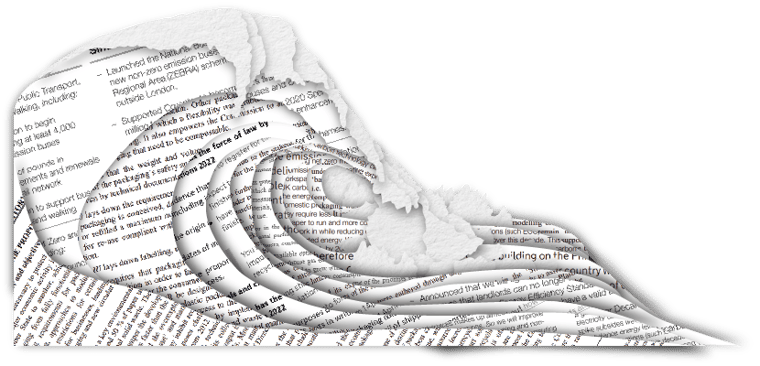
Wave of change - embracing sustainability regulations for business growth
January 2024
by the 42T Sustainability Team
Understanding and adapting to regulatory changes is becoming increasingly crucial for businesses across industries. Many companies often find themselves scrambling to keep up with regulatory changes, instead of proactively designing products and processes that meet these evolving standards. This article explores the trend of adapting to sustainability regulations and policies, not as a necessity but as a strategic focus for businesses to gain long-term competitive advantages.
Historically, organisations have found themselves reacting to policy changes, but the current scenario calls for a more intentional approach. Companies should be gearing up for upcoming legislation and integrating sustainability objectives as part of their growth strategies.
This outlook will enable them to develop products and processes that are not only compliant with current regulations but are also poised to meet future legislative changes. This forward-thinking strategy will give businesses a competitive advantage over those who are slower to adapt.

A notable example is the response to regulations for single-use packaging. Similar trends are now emerging with the Packaging Waste Regulations (PPWR) and Eco-design directives. Furthermore, the growing trend of voluntary commitments to net-zero greenhouse gas emissions targets highlights an active shift in corporate environmental responsibility.
However, significant policy gaps remain in achieving national targets, indicating potential areas where future regulatory enforcement may arise.
Predicting future regulations may be challenging, but businesses can utilise various tools and principles to stay informed and prepared.
Life cycle assessment principles, existing voluntary commitments, and circular design principles are vital in anticipating future regulatory landscapes. In particular, the increasing focus on net zero reporting and biodiversity is expected to bring more regulations affecting all industries.
With a global trend towards stricter environmental accountability, governments worldwide are progressively implementing policies to meet international agreements, which we’ve seen often translate into regulations focusing on reducing carbon emissions and preserving biodiversity.
Whilst we cannot precisely predict what future regulatory landscapes will look like, businesses have a variety of tools at their disposal for making better-informed recommendations.
We believe life cycle assessment principles and carbon footprint assessments are crucial in understanding and reducing environmental impacts across product life cycles.
Existing voluntary commitments can guide businesses in aligning with emerging standards. With a growing belief that early and proactive adaptation to environmental legislation can yield significant commercial benefits, utilising these tools to adjust strategies and operations will not only improve market positioning in an increasingly eco-conscious consumer landscape, it can also place organisations in a stronger financial position.
Our commitment to sustainable practices is evidenced by our client projects. Since 2019, a significant majority of our packaging projects have incorporated elements of sustainability regulations. This experience positions us to offer valuable insights and strategic guidance to our clients in navigating the intricacies of sustainability principles.
The influence of sustainability policies extends beyond compliance. It is reshaping the very essence of product and process design. Regulations aimed at reducing environmental impact are set to redefine what products are made of, their usage, manufacturing processes, and even their sales and reuse strategies. This comprehensive change underscores the need for businesses to adopt a holistic view of sustainability, integrating it into every aspect of their operations.
Public and media focus on environmental issues can significantly sway legislative agendas. Businesses need to be aware of topics gaining public traction as these often herald upcoming legislative actions.
Despite leaders demanding laws and ‘well-funded regulation to protect the environment’, navigating the wave of change in sustainability regulations requires more than compliance; it demands strategic foresight and adaptation.
We are committed to guiding our clients through these changes, not just in response to new regulations but in anticipation of them. By partnering with 42T, businesses can transform regulatory challenges into opportunities for innovation, operational efficiency, and competitive advantage. In embracing this forward-thinking approach to sustainability, companies can ensure they are meeting current standards and are well-prepared for future developments, ultimately leading to a more sustainable and successful business model.
Was this trend article useful? Have a challenge of your own?
Email answers@42technology.com or give us a call on +44 (0)1480 302700.
Share this article:
Related Articles

Consumer, Sustainability
The refillable revolution - the sustainable future of grocery shopping

Sustainability, Industrial
The surge in the global Blue Economy - what role for deep tech?

Sustainability, Industrial
The hydrogen economy - solving difficult challenges towards energy transition

What will you ask us today?
We believe in asking the right questions to drive innovation; when we know the right questions, we generate the ideas to answer them.





